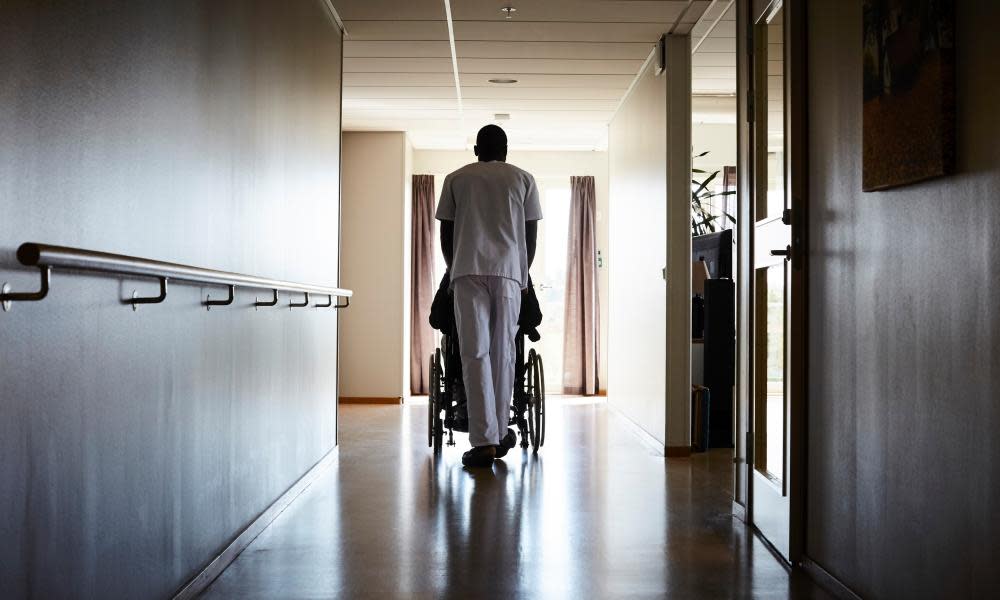Scale of aged care Covid deaths laid bare as staff prepare to strike

Aged care providers have reported more than 350 Covid deaths since the election campaign began and continue to grapple with at least 60 deaths a week, government data shows.
An analysis of government data, conducted by the United Workers Union and confirmed by the Guardian, shows that Covid deaths in aged care facilities are now occurring at rates unseen in the first two years of the pandemic.
Aged care workers are preparing to strike across the country again on Friday, furious at low pay, torrid conditions, and a lack of recognition of the huge workload and workforce pressures caused by Covid.
The latest government report shows 1,418 Covid deaths have been reported by aged care providers so far in 2022, accounting for about one in four of all Covid deaths in Australia. That dwarfs the 686 deaths in aged care in 2020 and 231 deaths in 2021.
In the last three weeks on record, there were 65, 89, and 85 deaths reported by aged care facilities respectively.
The average deaths a week this year has hovered at about 75.
There were 761 active outbreaks in aged care facilities in the week up to 13 May, including 205 in New South Wales, 191 in Victoria, 120 in South Australia, 100 in Queensland, and 103 in Western Australia.
More than 3,300 aged care residents and 1,999 staff were Covid positive in those 761 outbreaks.
The UWU’s analysis of data for individual aged care providers showed 39 facilities in five states have recorded five deaths or more this year, with nine recording deaths in double figures.
The prime minister, Scott Morrison, on Wednesday said Australia was now “living with Covid”, dismissing suggestions of further lockdowns or mask mandates to limit Covid-19 transmission in the community.
Morrison was asked whether the death toll was acceptable and what he was doing to curtail it on Wednesday. He said each death was a “terrible loss”.
“As the number of cases has risen, that’s what was always going to happen,” he told reporters.
“What you see when you have case numbers of that level is that people, when they pass away from many other causes, they will die with Covid, and their deaths are recorded as Covid deaths – but that doesn’t necessarily mean … that they passed away because of Covid. That’s a very different proposition.”
‘No let up’ for aged care staff
The UWU’s aged care director, Carolyn Smith, questioned why Covid had disappeared from the public debate, when 350 older Australians had died during the election campaign alone.
“Aged care workers are continuing to turn up to care for residents while these political leaders are only turning up for campaign photo opps,” she said.
Smith said the pandemic continued to be distressing for aged care residents who were locked up in their rooms, and devastating for families and workers, who were shouldering huge workloads.
Related: Inquiry reveals 50,000 Covid-related fines issued in Victoria
“There is a public perception the Omicron wave has passed but for aged care workers working double shifts in full PPE there has been no let up and the aged care crisis is in full swing,” she said.
Aged care workers are expected to strike on Friday in SA and Queensland as they fight for better wages and conditions. The sector has also pleaded with the government to fund a pay rise and to improve funding for Covid prevention.
A spokesperson for the aged care minister, Richard Colbeck, said the government continued to ensure older Australians have access to Covid and flu vaccines in the current comprehensive rollout.
The spokesperson said Australia had fared far better than other nations in its handling of aged care deaths.
“While every single Covid-related death in aged care is a tragedy, a global comparison in death data clearly illustrates how the measures implemented as part of the Government’s pandemic plan has saved tens of thousands of lives,” he said.
“Our comprehensive winter dose program will ensure these protections continue.”

 Yahoo Movies
Yahoo Movies 
